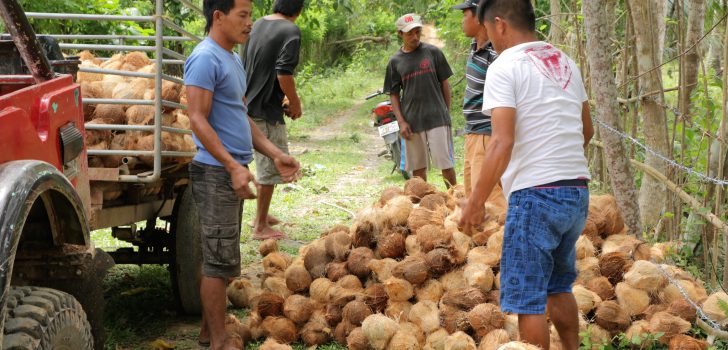 Coconut husks left as land wastes are commonly left under coconut trees until rotten. PRDP seeks to maximize the use of the coconut by turning these wastes into geo-nets and fiber. (Photo by: Darrell Sunga, DA-PRDP InfoACE Unit)
Coconut husks left as land wastes are commonly left under coconut trees until rotten. PRDP seeks to maximize the use of the coconut by turning these wastes into geo-nets and fiber. (Photo by: Darrell Sunga, DA-PRDP InfoACE Unit) From wastes to wallets – living off the tree of life
Being the largest producer of coconut in Central Luzon, covering around 173,017.00 MT (PSA, 2013), farmers in the province of Aurora are continuously seeking for ways on how to develop and make the most out of the “tree of life.”
Around 150 million coconuts are being produced every year in Aurora, and about 90 million of these are disposed as brown nuts or niyog. A small portion from the coconut husks is used for fuel and cooking, while the remaining unused portions are being left rotten with no value under coconut trees.
With the Philippine Rural Development Project (PRDP), wastes from coconut production will now become a source of income of rural farmers and locals.
An enterprise proposal of the province’s local government unit amounting to P4.1 million will soon be established in Maria Aurora to further develop the coconut industry in the area, and to provide additional livelihood to coco farmers and their families.
Managed by the Maria Aurora Development Cooperative (MADECO), the new project involves a processing plant that will produce baled fibers and geo nets by crushing the coconut husks.
The main inputs for the processing facility are coco husks which are commonly left as farm land waste, purchased from coconut farmers. By processing the husks, 70% will be made into peat and 30% into fiber.
Processing facilities such as decorticating, twining machine, winnowing machines, weaving machines and bailing machines will be acquired for the project operations including other equipment needed in the operations.
PRDP Luzon A Cluster Deputy Project Director Elma Mananes who personally visited the site of the project challenged to the members of MADECO to do the business in a right and best way to prove that they deserve to be the beneficiaries of the PRDP subproject.
“From waste to money, through the PRDP the laborers can have extra livelihood and income,” she said.
“I hope that someday, MADECO will become an international supplier of coir and coir by products (geo nets and bailed coco fiber),” added DPD Mananes.
One of the notable impacts of the project is the employment of 80 women as weavers. Currently, these women depend on the income of their spouses, who work as farmers. But with the PRDP enterprise, they can earn and still continue with their daily household activities such as attending to their children and doing household chores.
A 10% increase in the income of coconut farmers is expected during the first year of the operation, and about 30% within six years.
The PRDP, the government’s main platform for rural development, aims to improve rural economy by operationalizing local-level convergence among agricultural stakeholders, synergizing programs and projects for modern, climate-smart and market-oriented agri-fishery sector that benefits the greater segment of farmers and fishers. (Kayla Arceo and Dianne Lapuz, DA-PRDP North Luzon InfoACE)
